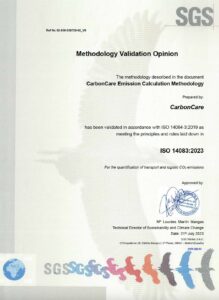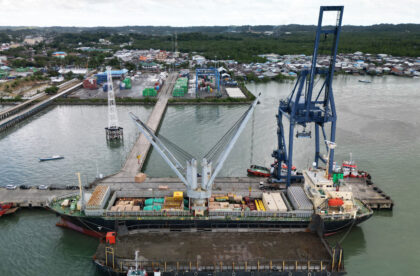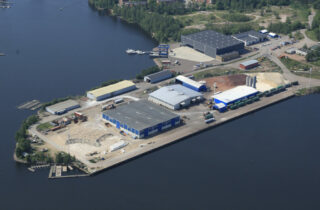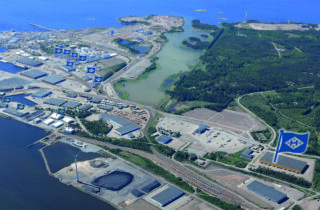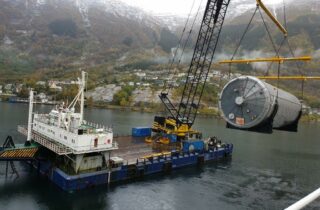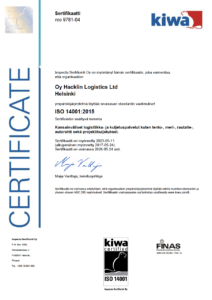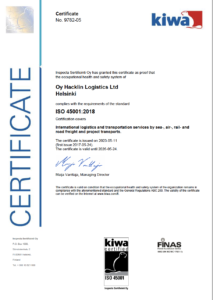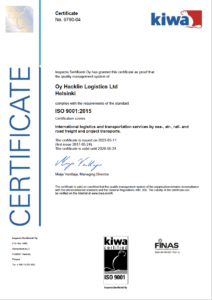![]()
Services for bulk material handling, warehousing and transports
Corporate Sustainability
Sustainability policy
2024 – SUSTAINABILITY POLICY – Hacklin Logistics
Sustainability actions
- We are concerned about the caused impact of the logistics and freight forwarding industry activities
- We aim to minimize the environmental harmful consequences of the industry
- We constantly develop and integrate sustainability measures into the daily activities and provided services
- We aim to develop processes which are less harmful to the environment, remain economically efficient and safe for employees and customers.
- We continuously develop operations for the improvement of environmental sustainability
Sustainable logistics
For Hacklin, sustainable green logistics is more than just an option. We provide variety of tools starting from CO2 reporting to supply chain optimisation in order to design and manage ethical and sustainable supply chains. Let’s make an impact together!
Green logistics commitment
Logistics companies carry a great responsibility in the green transition. Hacklin actively collaborates in reduction of the environmental damage and minimization the consumption of the natural resources.
Read more about what role sustainability and environmental factors play in Hacklin Logistics’ everyday decisions
Following the principles of environmental responsibility, we strive to manage logistics as economically, systematically and as appropriate as possible. We implement ISO 14001:2015 standard to engage with UN targets and to contribute to 1-15 sustainable development goals.
Our environmental responsibility includes caring for the environment in our daily work as follows:
• Developing and controlling safe processes, technologies and service
• Improved process efficiency
• Reduced energy and chemical consumption
• Reduced use of printed paper and support increased recycling
• Minimized food waste
• Careful travel planning using the most environmentally friendly methods, when possible
• Reduced sustainability risks in supply chain
• Follow environmental laws and regulations
Hacklin Logistics has invested into the technological sustainable solutions to ensure the corporate sustainability, such as:
• Obtaining the corporate electric cars for the usage of employees in attempt to minimize the carbon footprint, encouraging the initiative in usage of public transport while commuting to and from the workplace
• We actively monitor subcontractor’s performance on optimizing the logistics solution offered (suggesting possible cargo combinations, combining containers on the same vehicle, LTL and LCL transport solutions) or investing into electric trucks or using biofuel
• Hacklin organizes workshops for employees on company´s sustainable development, reducing waste of daily operations, decrease the electricity needed etc.
Hacklin Logistics is committed to ensure the health, and safety of its employees. Our Quality, Health, Safety and Environment Policy is audited by Inspecta.
Our employees are trained regularly in order to be able to perform their work tasks in a safe way. Hacklin Logistics management ensures that all processes are taking the QHSE aspects in consideration in order to identify and minimize the risks of our employees.
QHSES is a part of all our processes in such a way that enables us to constantly provide high-quality performance to our clients. As we are a non-asset-based provider with limited own equipment, we are regularly auditing our partners and we do not compromise where the question is about health, safety, security or environmental protection.
Hacklin Logistics applies CarbonCare Emission Calculation Methodology in accordande with ISO 14064-3:2019 as meeting the principles and rules laid down in ISO 14083:2023.
We calculate emissions generated in the global, holistic transport chains, using Transport Chain Elements (TCEs). Carbon Care calculates seven TCEs: road, air, open sea, rail, IWW (inland waterways), ferry and hub. Carboncare calculates SCOPE 3 emissions.
Calculations
CarbonCare is validated not only for ISO 14083:2023, but also according GLEC (and former EN16258) which provides maximum credibility
The calculation covers the entire transport chain with all “transport chain elements” (TCE) including all transshipment activities (called “HUBs”). The norm rules that only outgoing Hub activities are included.
CO2e values
According to the ISO norm’s requirement, CarbonCare publishes the following CO2e-values:
• TOT Total emissions (comparable to WTW: Well-to-Wheel)
• OPS Operational emissions (comparable to TTW: Tank-to-Wheel)
• ENE Energy provision (comparable to WTT: Well-to-Tank)
• EI Emission Intensity gr/tkm or gr/t
• All emission factors are adapted according to ISO 14083:2023. ISO has different emission factors for North America and Europe (Rest of World) and so, the emission values might change slightly.
• “Cooling” (or Reefer) is taken into account in all modes of transport (according to ISO: “Transport Chain Elements” – like ROAD, AIR, RAIL, SEA, IWW, FERRY & HUB). “Refrigerant Leaking” is included (a MUST according to ISO).
• All distances are calculated according to the “shortest feasible distance” (SFD) except AIR, which still will be calculated according to “great circle distances”. FERRY has newly the options for ROPAX and RORO ferries (small (<5000T) & large (5000-15000T), and IWW has more ships available with more detailed classifications.
